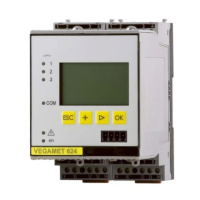1 Function as Modbus-TCP server
1.1 Modbus-TCP - general description
VEGAMET 624/625, VEGASCAN 693 and PLICSRADIO
®
C62 signal conditioning instruments work as Modbus-TCP
server and provide the existing PC/DCS value and relay
switching conditions in a temporary storage for collection via
Modbus-TCP.
The instruments stick to the "Open Modbus-TCP-Specifica-
tion" Release 1.0 of Schneider Electric. This standard is
supported by many process control systems, Remote IOs,
visualisation programs and OPC servers. Communication is
carried out via Port 502.
Apart from PC/DCS values there is the possibility to enquire
the switching conditions of the relay outputs.
The enquiry of the PC/DCS values and relay values is made
via the appropriate function code (see also Modbus specifi-
cation).
l Function code 01: Read Coil Status (enquiry of the relay
values)
l Function code 02: Read Input Status (enquiry of the relay
values)
l Function code 03: Read Holding Registers (enquiry of the
PC/DCS values)
l Function code 04: Read Input Registers (enquiry of the PC/
DCS values)
These function codes are normally available as library
enquiries in the PLC (e.g. Modicon).
VEGAMET 624/625 and PLICSRADIO
®
C62 can provide up to
six PC/DCS outputs, VEGASCAN 693 up to 30. There are also
four relay values (one fail safe relay, three level relais, with
VEGASCAN one fail safe relay).
Via the selected PC/DCS output you define where the
respective measured value can be collected within the
temporary memory. The configuration of the PC/DCS outputs
is carried out via PACTware™/DTM.
1.2 Filing of the measured value as 2 byte short
The adressing of the PC/DCS values for Modbus systems is
carried out "Word-orientated". In the temporary memory, a PC/
PC/DCS output
Modbus-TCP, VEGA ASCII protocol - VEGAMET 624/625, VEGASCAN 693, PLICSRADIO 3
Function as Modbus-TCP server
30768-EN-070730

